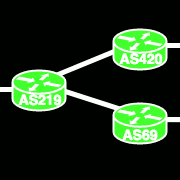|
In 1969, not long after some dudes said "Yo fairchild your poo poo is garbage" and left Fairchild Semiconductor to start Intel, some other dudes also said '"Yo fairchild your poo poo is garbage" and started AMD. For years they made random logic and eventually flash chips, and also manufactured some Intel designed processors to act as a second source or something. They also tried making their own x86 processor, which ended up being mediocre. Then they bought a company called NexGen, and managed to leave their acquisition alone long enough for them to make a good x86 processor, the K6. This was followed up by the K7, which was designed by the rest of AMD, which was also a decent processor, while the NexGen team worked on the K8, which would become the Athlon 64 series. The Athlon 64 was awesome and pretty successful, partially because it was a good chip, and partially because Intel fell flat on it's face at the time of it's release. Intel made two big fuckups: They assumed anyone ever would want to buy an Itanium, and they assumed that dennard scaling would let them keep scaling the frequency of the Pentium 4 at 90nm and beyond. Both of these turned out to be wrong, leaving Intel selling lovely space-heater P4 processors that ran so hot they tried to created a new form factor (BTX) to handle them. Fortunately for Intel, they managed to bribe/blackmail OEMs into not using AMD processors, although with AMDs limited production capabilities and growing mismanagement they probably couldn't have grabbed that much of Intel's market shre anyway. The $1 billion settlement Intel eventually had to pay for playing dirty gave AMD one of their last profitable quarters. Anyway, as the K8 was having a little bit of success, AMD being a giant company full of lovely middle-management was starting to become a factor. A great overview of all the dumb poo poo happening comes from ranting posts from this guy cmaier in macrumours of all places: http://forums.macrumors.com/threads/apple-considering-adopting-amd-processors-for-upcoming-macs.898409/page-25#post-9746191 . Read all of his posts in that thread, it paints an amazing picture of their dumb management. I dunno if he's right about the automated tools being bad though, as the market was kind of going in that direction anyway. I'm sure AMD implemented it in a super-dumb way, though. Anyway, AMD engaged in a directed effort to rid themselves of good engineers who don't want to deal with stupid bullshit and were highly successful. Then, they decided to buy Canadian graphics company ATI so that they would have some company on their sinking ship. This was long overdue, as Canadians aren't supposed to have tech companies, so that we can focus on cutting trees and pumping oil and leave the innovation to Americans. Anyway ATI has slowly been strangled, and instead of trading blows with NVIDIA like they did before the buyout, they are now starting to fall behind. Next, desperate for cash, AMD sold their fabs to some dudes from the UAE. Although somewhat behind Samsung and TSMC in bringing out new process tech, GlobalFoundries seems to be doing okay now that it's free of AMD. 22nm FD-SOI looks neat at least. AMD has not released a great CPU since the K8, and have released nothing but dumpster fires for the past few years. They are presumably almost done making GBS threads up what's left of ATI, and will be releasing dumpsterfire GPUs in a few generations, if they even get that far. No one wants to buy an APU except to use as a console SoC, and the only reason they got those design wins is because they offered a very cheap chip to console makers who needed a very cheap chip. They are rumoured to be in the next nintendo console (which no one will buy), but the console revenue is not enough to save the company. So what happens to AMD? - Full-blown bankruptcy? - Taken over by private equity, fire almost everyone, get that sweet console chip revenue? - Bought by someone? Market cap is less than one instagram now. Oh, and no one in the US gives a gently caress about monopoly/antitrust, unless Intel teabags the DOJ or something it's not an issue. Meanwhile europe wants to go after sexy targets like google, not CPU/GPU makers. Intel/NVIDIA "having a monopoly" is not something that is a problem legally. Also no one can agree on how the cross-licensing agreement (for a varied array of x86-related patents on stuff like x64, SSE2, etc.) between AMD and Intel works. The best claim I've seen says that in the event of bankruptcy or buyout of AMD, AMD loses access to the cross-licensed patents, but Intel can keep on using them. So buying AMD means you have to negotiate a new x86 deal with Intel.
|
|
|
|

|
| # ? May 4, 2024 19:55 |
|
yes
|
|
|
|
DuckConference posted:In 1969, not long after some dudes said "Yo fairchild your poo poo is garbage" and left Fairchild Semiconductor to start Intel, some other dudes also said '"Yo fairchild your poo poo is garbage" and started AMD. For years they made random logic and eventually flash chips, and also manufactured some Intel designed processors to act as a second source or something. They also tried making their own x86 processor, which ended up being mediocre. interesting
|
|
|
|
i approve of this effortpost i had a k6 and a k8, they were pretty good chips, rip amd, i'll pour one out for you ok maybe just part of one
|
|
|
|
rjmccall posted:i approve of this effortpost you could pour one out for bulldozer by pouring out two halves and having it add up to less than a whole in a growing pc market AMD would be hosed, in a shrinking pc market they are double hosed
|
|
|
|
rjmccall posted:i had a k6 and a k8, they were pretty good chips, rip amd
|
|
|
|
A Massive Disaster
|
|
|
|
Athlon 64 3800+ supremacy
|
|
|
|
DuckConference posted:you could pour one out for bulldozer by pouring out two halves and having it add up to less than a whole lol
|
|
|
|
amd lol only thing good they mad was the athlon 2400
|
|
|
|
the 2500+ Barton core was rad too
|
|
|
|
I had a 2600+ Barton once, it was pretty good i guess
|
|
|
|
We should all invest in AMD. Cant go lower right!
|
|
|
|
AMD stock can only go up uP UP
|
|
|
|
I think it's bad though that there hasn't been any meaningful competition for Intel for the past couple of years because their processors haven't really improved as much as a result.
|
|
|
|
DuckConference posted:In 1969, not long after some dudes said "Yo fairchild your poo poo is garbage" and left Fairchild Semiconductor to start Intel, some other dudes also said '"Yo fairchild your poo poo is garbage" and started AMD. For years they made random logic and eventually flash chips, and also manufactured some Intel designed processors to act as a second source or something. They also tried making their own x86 processor, which ended up being mediocre. didn't read
|
|
|
|
that post was entirely AuthenticAMD
|
|
|
|
I've never run a single AMD processor and given how lame of a company Intel is I can't imagine how fuxken lame amd must be in the design department.
|
|
|
|
whatever happened to matrox and a bunch of other graphics card makers from the '90s
|
|
|
|
Hed posted:whatever happened to matrox and a bunch of other graphics card makers from the '90s They died. 
|
|
|
|
Matrox still focuses on what they always did. Multimonitor 2d performance poo poo
|
|
|
|
spankmeister posted:I think it's bad though that there hasn't been any meaningful competition for Intel for the past couple of years because their processors haven't really improved as much as a result. the collapse of the pc market and the difficulty and expense of moving to new process nodes probably has more to do with this than competition
|
|
|
|
Also AMD releases new products every 3 years or some poo poo
|
|
|
|
When will mobile move away from ARM and finally coldly embrace the inevitable x86 architecture?
|
|
|
|
Hed posted:When will mobile move away from ARM and finally coldly embrace the inevitable x86 architecture? What's the benefit?
|
|
|
|
rip 4000+ venice those were the days, just wait a few months and get an fx-53 at mainstream pricing
|
|
|
|
Hed posted:When will mobile move away from ARM and finally coldly embrace the inevitable x86 architecture? when intel gives every phone manufacturer enough cash to "convince" them its a good idea
|
|
|
|
Hed posted:When will mobile move away from ARM and finally coldly embrace the inevitable x86 architecture?
|
|
|
|
Raere posted:Athlon 64 3800+ supremacy 
|
|
|
|
idk op my AMD FX processor is still suiting my needs
|
|
|
|
Hed posted:When will mobile move away from ARM and finally coldly embrace the inevitable x86 architecture? never, Intel no longer leads in process tech, esp. for mobile-focused processes, and I don't think Samsung has much interest in making x86 chips
|
|
|
|
DuckConference posted:Also no one can agree on how the cross-licensing agreement (for a varied array of x86-related patents on stuff like x64, SSE2, etc.) between AMD and Intel works. The best claim I've seen says that in the event of bankruptcy or buyout of AMD, AMD loses access to the cross-licensed patents, but Intel can keep on using them. So buying AMD means you have to negotiate a new x86 deal with Intel. if intel's smart about it they'd let whoever bought AMD either just keep the licensing agreement or resell it at a bargain, a la microsoft injecting a few hundred million dollars into apple in the 90s so that they could at least pretend to claim they had competition in the OS market like if it was the 90s and someone had bought them out i'd see intel cutting them off, but these days a competitor is literally worth more in terms of the ability to defuse antitrust action with the legal fiction of a robust market
|
|
|
|
as you noticed, it's not the 1990s. why would the DOJ give a poo poo about the x86 market? the average person doesn't even know what the gently caress that is
|
|
|
|
by the same token, who else is going to try and compete against intel in x86, even with free cross-licensing?
|
|
|
|
sparc and power poised to make a huge comeback
|
|
|
|
supposedly MS spends a billion a year on the APUs for the Xbox, and that's not far from AMDs market cap but then Intel could still soak them for major money anyway so it probably doesn't make sense
|
|
|
|
|
|
|
|
amd was cool back when intel needed super-expensive rambus memory and when the later model p4 chips were slow space-heater poo poo, but even back when amd made some good chips you had to pair them with some garbage chipset from hell. the via chipset motherboard i had back in the duron days was the jankiest poo poo ever and would randomly lock up unless you tweaked some registry value and the hard drives made a weird clacking noise when shutting down unless you used a specific older version of the drivers. later nforce chipsets were better, but still poo poo. the one my brother had needed some tiny, loud cooling fan for one chip and for some reason io on that board was really slow.
The_Franz fucked around with this message at 00:17 on Jul 18, 2015 |
|
|
|
there were some good chipsets, like nforce 2, and uh... also the reason nforce exists is that the Xbox 1 (as in the first Xbox) was supposed to be amd, except the day before the launch Intel made a phone call and well it was a 733Mhz celeron instead. nvidis had been developing the chipset and pushed it into a retail predict when amd lost the first Xbox
|
|
|
|

|
| # ? May 4, 2024 19:55 |
|
it's been a long time since i ran amd but i seem to recall that via was like the second
|
|
|



































